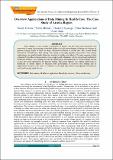| dc.contributor.author | Diwani, Salim | |
| dc.contributor.author | Mishol, Suzan | |
| dc.contributor.author | Kayange, Daniel | |
| dc.contributor.author | Machuve, Dina | |
| dc.contributor.author | Sam, Anael | |
| dc.date.accessioned | 2023-11-02T09:55:35Z | |
| dc.date.available | 2023-11-02T09:55:35Z | |
| dc.date.issued | 2013-08 | |
| dc.identifier.uri | https://dspace.nm-aist.ac.tz/handle/20.500.12479/2407 | |
| dc.description | A research article was submitted to International Journal of Computational Engineering Research||Vol, 03||Issue, 8| 2013 | en_US |
| dc.description.abstract | Data mining as one of many constituents of health care has been used intensively and
extensively in many organizations around the globe as an efficient technique of finding correlations or
patterns among dozens of fields in large relational databases to results into more useful health
information. In healthcare, data mining is becoming increasingly popular and essential. Data mining
applications can greatly benefits all parties involved in health care industry. The huge amounts of data
generated by healthcare transactions are too complex and voluminous to be processed and analyzed by
traditional methods. Data mining provides the methodology and technology to transform huge amount
of data into useful information for decision making. This paper explores data mining applications in
healthcare in Arusha region of Tanzania more particularly; it discusses data mining and its
applications in major areas such as evaluation of treatment effectiveness, management of healthcare
itself and lowering medical costs | en_US |
| dc.language.iso | en | en_US |
| dc.publisher | IJCER | en_US |
| dc.subject | Data mining | en_US |
| dc.subject | Healthcare application | en_US |
| dc.subject | Knowledge discovery | en_US |
| dc.subject | Data warehousing | en_US |
| dc.title | Overview applications of data mining in health care: The case study of Arusha region | en_US |
| dc.type | Article | en_US |

